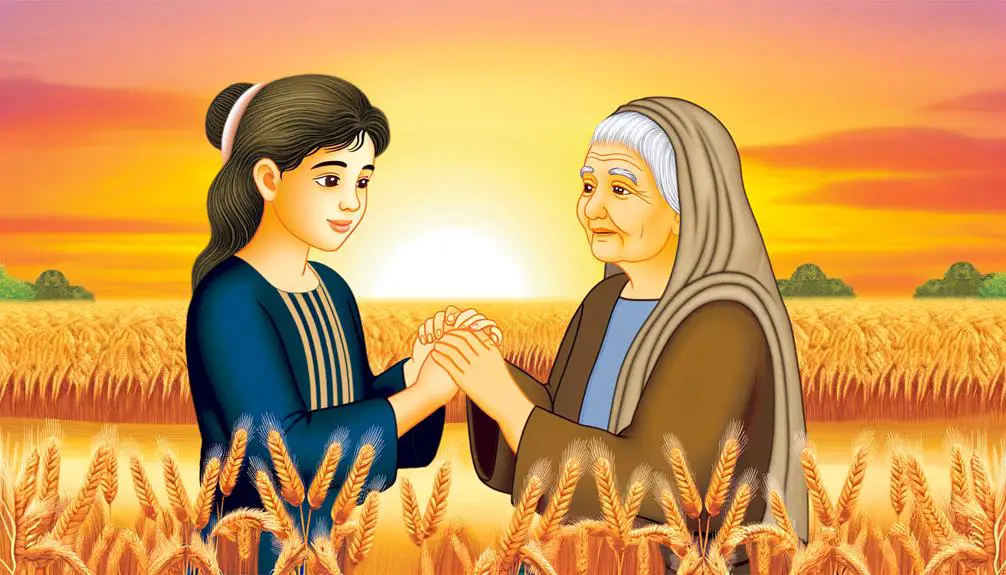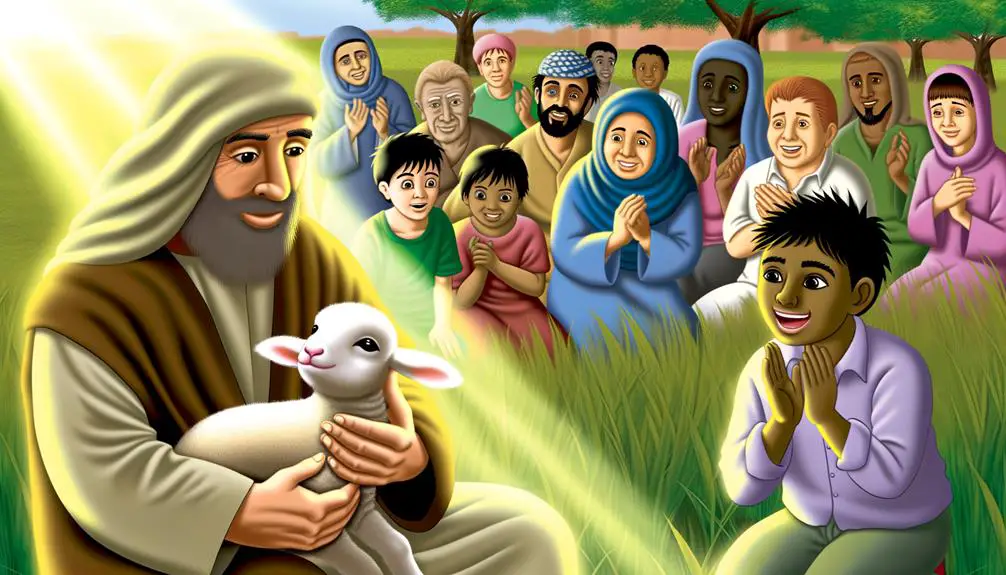Explore timeless tales of love, loyalty, and sacrifice in the Bible, revealing profound insights into divine and human relationships.

Examples of Love in the Bible
In the Bible, you find profound examples of love that extend across various forms of relationships, reflecting both divine and human affection. Adam and Eve's relationship sets the foundation for mutual support and interdependence, illustrating the complexities of love's role in human connections. Abraham's willingness to sacrifice Isaac underscores a deep trust and obedience intertwined with paternal love, revealing emotional layers in faithful devotion. Ruth's unwavering loyalty to Naomi highlights love's power to transcend cultural boundaries and personal loss, fostering familial bonds. Additionally, David and Jonathan's friendship exemplifies a platonic, sacrificial love that strengthens communal ties. Each narrative invites further exploration into these timeless themes.
Key Takeaways
- Adam and Eve's relationship showcases the foundational model for human love and interdependence.
- Abraham's willingness to sacrifice Isaac highlights profound parental love and faith.
- Ruth's dedication to Naomi exemplifies deep familial loyalty and devotion.
- David and Jonathan's friendship represents a strong bond of platonic love and mutual support.
- Jesus's teachings and actions emphasize compassionate love towards all humanity.
Adam and Eve's Initial Bond

Adam and Eve's initial bond, as depicted in the Bible, wasn't merely about companionship; it was a foundational model for human relationships, illustrating both unity and the complexities of interdependence. This tale, set in the context of Edenic innocence, exemplifies how love and relational dynamics are entwined with shared responsibilities and moral obligations. You see, their bond was designed to be complementary, where each supported the other, underpinning the ideal of mutual dependence.
The narrative conveys that in the state of Edenic innocence, there existed an unblemished form of love, uncorrupted by deceit or manipulation. This pristine beginning highlights a time when responsibilities were shared harmoniously, without the burden of conflict or the shadow of future transgressions. Their connection, hence, wasn't just romantic but served as a blueprint for how you should engage in and nurture relationships – with honesty, openness, and shared responsibility.
However, the complexities of their interdependence become evident as the story unfolds. The pivotal moment of their joint decision to eat from the forbidden tree illustrates the transformative impact of choices within a relationship. It underscores that while love can be a source of strength, it also demands vigilance and accountability from all parties involved.
Abraham's Sacrifice for Isaac
In the harrowing tale of Abraham's sacrifice, trust becomes the cornerstone of his profound test of faith, where you witness a pivotal moment that profoundly shapes theological discourse on obedience and love. This biblical episode, where God commands Abraham to sacrifice his son Isaac, serves as a divine test not only of Abraham's faith but also of his parental love. You're invited to explore the complexities of a father's love intertwined with unwavering faith in God.
When you consider the emotional turmoil Abraham must have experienced, it highlights a conflict at the heart of parental love—obedience to the divine versus the natural human instinct to protect one's child. His willingness to surrender his deeply cherished son underscores a submission to God that transcends personal loss. This act, deeply disturbing yet powerfully illustrative, raises key questions about the limits and demands of faith.
Moreover, this narrative isn't merely about Abraham's faith; it's also a reflection on Isaac's trust in his father. This layer adds depth to the understanding of mutual trust and the dynamics of familial love under extreme spiritual duress. Therefore, Abraham's ordeal exemplifies an extraordinary display of faith filled with personal sacrifice, a theme central to the broader theological framework of sacrificial love in the Bible.
Ruth's Loyalty to Naomi

Amid the tapestry of biblical narratives, Ruth's unwavering loyalty to Naomi stands out as a profound demonstration of familial devotion and self-sacrifice. This story, nestled within the Book of Ruth, not only illuminates the bonds of kinship but also showcases the influence of Naomi's wisdom on Ruth's decisions. As you explore further, you'll recognize that Ruth, a Moabite, chose to migrate with Naomi back to Bethlehem after the death of her husband, Naomi's son. This decision wasn't trivial; it was laden with social and economic risks.
The narrative insightfully highlights how Naomi's sagacious guidance was pivotal. She navigated through her own grief to advise Ruth, fostering a resilience that would sustain them both. This aspect of the story underscores a reciprocal loyalty, where Naomi's wisdom nurtures Ruth's allegiance, and in turn, Ruth's commitment provides Naomi with a renewed purpose and hope.
Your understanding of this relationship deepens when considering the context of the Moabite migration. Ruth's integration into a foreign community, influenced by Naomi's counsel, exemplifies an extraordinary adherence to family, transcending cultural and national boundaries. The layers of their bond reveal a complex interplay of love, loyalty, and survival, resonating through their shared journey.
David and Jonathan's Friendship
As you explore the bond between David and Jonathan, you'll find their friendship exemplifies devotion that transcends familial obligations. Their covenant of mutual support not only underscores their personal loyalty but also illuminates broader themes of sacrifice and commitment within the scriptural narrative. This relationship serves as a profound expression of the power and depth of platonic love in biblical lore.
Devotion Beyond Family Ties
David and Jonathan's friendship exemplifies a profound level of devotion that transcends familial bonds, illustrating a deeper, covenantal relationship rarely seen in ancient texts. This bond, though not marital, echoes the qualities of marital unity in its exclusivity and depth, hinting at a form of love that isn't confined to blood relations but extends to chosen kin. Their alliance also underscores an often-overlooked aspect of community care, where personal relationships strengthen communal ties and foster societal stability. By placing their trust and loyalty in each other, David and Jonathan not only nurtured their personal connection but also contributed to the broader social fabric, demonstrating that true friendship can indeed influence and reinforce community well-being. Such narratives invite you to reflect on the power of relational bonds in communal contexts.
Covenant of Mutual Support
While exploring the covenant between David and Jonathan, it's important to recognize that their mutual support system set a biblical precedent for interpersonal loyalty and sacrificial friendship. Their bond transcended the typical marital alliances of their time, weaving Divine promises into the fabric of their commitment. Consider these aspects:
- Jonathan's Sacrifice: He relinquished his right to the throne in favor of David, defying expectations and prioritizing their covenant.
- Protection against Saul: Jonathan repeatedly protected David from Saul's wrath, demonstrating his loyalty.
- Spiritual Bond: Their friendship was rooted in a shared reverence for God's will, enhancing the sacredness of their alliance.
- Enduring Legacy: Their relationship set an enduring example of unconditional support and love, untouched by personal gain.
Jesus's Compassion for Humanity

Throughout the New Covenant, Jesus's compassion for humanity emerges as a central theme, reflecting his profound empathy and unwavering commitment to alleviating human suffering. His healing miracles and parable teachings serve as poignant demonstrations of this compassion. The healing of the blind, the leper, and the paralyzed are not merely acts of physical restoration but also profound assertions of his desire to restore wholeness to every aspect of human life—spiritual, emotional, and social.
Jesus's parables, such as the Good Samaritan and the Prodigal Son, further underscore his deep care for humanity. These stories aren't just instructive lessons; they are insights into Jesus's vision of a compassionate society. They challenge you to see beyond societal norms and to embrace a radical love that crosses boundaries and conditions.
Through these acts and teachings, Jesus exemplifies a love that is active and engaging. He doesn't stand distant, but enters into the very depths of human experience. Your understanding of his compassion isn't merely to admire, but to emulate. In doing so, you participate in a love that is transformative, both for oneself and for the world around you. This is the essence of Jesus's message—a call to live out compassion as he did.
Paul's Love in Corinthians
As you explore Paul's exposition on love in Corinthians, you'll find that his definitions underscore the enduring and selfless nature of true love. This perspective was revolutionary, influencing how early Christians formed their communities and interacted with one another. Understanding these characteristics sheds light on the broader implications of love as a fundamental Christian value.
Characteristics of True Love
Paul's depiction of love in Corinthians emerges as a profound exemplar, illustrating that true love is patient, kind, and devoid of envy or boastfulness. Delving deeper, you can discern that this love isn't merely about romantic gestures or unconditional acceptance; it transcends to a more spiritual and enduring form of affection. Here's what it encompasses:
- Patience: True love waits without frustration or complaint.
- Kindness: It acts with consideration and compassion towards others.
- Selflessness: Love does not indulge in envy or boast; it seeks the good of others first.
- Truthful: It rejoices with the truth, not delighting in wrongdoing.
These characteristics forge a love that is both resilient and enlightening, providing a blueprint for genuine relationships.
Impacts on Early Christians
How did the depiction of love in Corinthians influence the behaviors and beliefs of early Christians? Paul's eloquent discourse on love, especially noted in 1 Corinthians 13, provided a foundational ethos that deeply affected community formation among early Christians. It wasn't just rhetoric; it became a practical guide. You can see this in how they cared for one another, sharing resources with a generosity that was uncommon in the broader Greco-Roman society. This love was radical, calling on believers to value others' needs as highly as their own, which fostered a strong, resilient community. Additionally, it inspired early martyrs, who upheld these ideals even unto death, demonstrating a profound commitment to love as the highest virtue. Their actions and sacrifices solidified communal bonds and attracted new believers, intrigued by such a powerful testimony of love in action.
Frequently Asked Questions
How Is Love Depicted Differently in the Old and New Testaments?
In the Old Scripture, love is often shown through covenant loyalty and prophetic metaphors, emphasizing duty and faithfulness. In contrast, the New Scripture portrays love as more personal and forgiving, focusing on grace and redemption.
Are There Any Examples of Unrequited Love in the Bible?
Yes, you'll find instances of unrequited love, both through romantic rejections and familial affection. These narratives offer deep insights into human emotions and relational dynamics, illustrating complex interpersonal interactions.
How Do Different Translations of the Bible Affect Interpretations of Love?
Ever wondered why Bible interpretations vary so widely? It's due to translation consistency and linguistic nuances which deeply influence how love is perceived and understood across different versions. Dive deeper to explore!
What Role Does Forgiveness Play in Biblical Love Stories?
In analyzing forgiveness dynamics, you'll find that reconciliation stories are central to understanding deeper human relationships. They underscore transformative interactions, highlighting how forgiveness is essential in resolving conflicts and fostering enduring bonds.
How Is Love Towards Enemies Portrayed in the Bible?
In analyzing love towards enemies, the Bible advocates an approach of enemy embrace and compassionate retaliation, urging you to counter hostility with kindness and breach traditional enmity with unexpected acts of love.



Sign up